Meybod Residents Demand Expulsion Of Illegal Afghans After Fatal Brawl
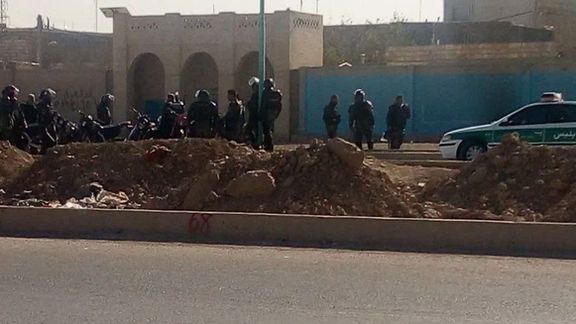
Iranians in Meybod took to the streets on Friday demanding the expulsion of illegal Afghans after a conflict between two groups led to the death of a young Iranian man.

Iranians in Meybod took to the streets on Friday demanding the expulsion of illegal Afghans after a conflict between two groups led to the death of a young Iranian man.
The murder, believed to have been committed by an Afghan national, led to calls on the authorities to remove the Afghans residing illegally in the city. According to reports, among the 90,000 population of Meybod, approximately 12,000 are Afghan nationals.
The commander of the Yazd police, Abbasali Bahdani Fard, claims a suspect has been arrested, less than 15 hours after the street brawl on Friday.
Local sources have identified the victim as Amir-Reza Aghaei with another Iranian hospitalized.
Ali Akbar Azizi, the deputy governor of Yazd, informed IRNA state news agency that some Meybod residents demanded the arrest and punishment of the murderer during Friday prayers.
Social media videos, allegedly related to the Friday prayers in Meybod, depict visible public anger and protests. Some reports suggest that protesters targeted the Friday prayers Imam, the governor, and the commander of the city's IRGC during the demonstrations.
Increased security measures and the deployment of special forces in Meybod on Friday were also reported, with videos circulating on social media capturing the scenes.
Iran international cannot independently verify the accuracy of the videos.
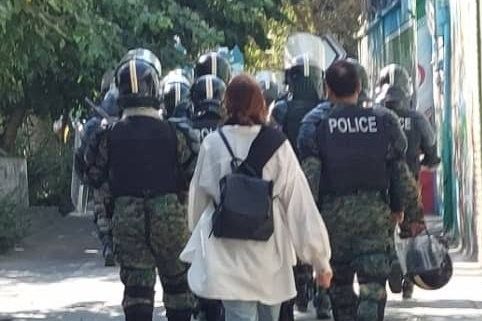
A base of the morality police in Afifabad Street, Shiraz, was set ablaze Saturday as hijab crackdowns reach unprecedented levels across Iran.
The incident follows more than a year of nationwide protests sparked by the death in morality police custody of Mahsa Amini last September, which has seen growing numbers of women in Iran rejecting the mandatory hijab.
Iran's parliament has since passed a stringent 'hijab bill' in mid-September, threatening violators with a severe penalty of up to ten years' imprisonment, in addition to stepping up morality police patrols and digital surveillance.
Women have been increasingly defiant ever since, going in public spaces such as shops, cafes and universities unveiled, and the regime has consequently deployed agents known as ‘hijab enforcers’ to public places.
Many hijab defiers have since been fined, jailed and banned from public spaces including schools and universities.
In late October, Armita Geravand, a 16-year-old student, succumbed to a head injury sustained during an encounter with Tehran's hijab enforcers in echoes of the death of Mahsa Amini one year before.
Armita fell into a coma on October 1st after being stopped by enforcers in the Tehran subway. While the government has not provided clear information about the incident, it appears that a female agent pushed her, leading to a severe head injury.
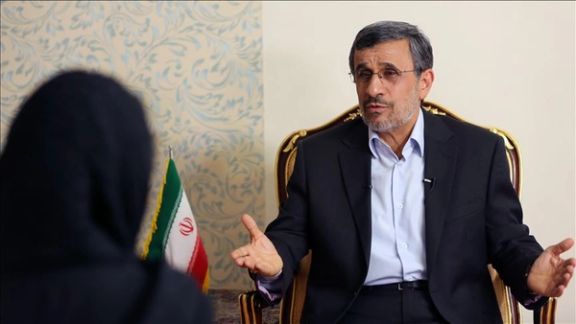
Iran's hardliners have recently made comments against former President Mahmoud Ahmadinejad, seemingly aiming to tarnish his image.
While Ahmadinejad faced considerable criticism for his populist policies during his presidency from 2005 to 2013, he stands out as one of the few politicians in the Islamic Republic who maintained popularity with a segment of the population during his provincial visits after leaving office.
Abdolreza Davari, one of Ahmadinejad's top aides during his presidency, recently said that "Ahmadinejad is under the illusion that the Islamic Republic is going to collapse." Davari claimed that Ahmadinejad’s apparent differences with the regime stem from the fact that he has been ostracized. He added that "After Supreme Leader Ali Khamenei cautioned him not to run for the 2017 Presidential elections, Ahmadinejad realized that he can no longer return to power."
At the time, Ahmadinejad had said that if Khamenei was against his decision to run for the presidency, he would have said it with a loudspeaker [meaning during a broadcast]. Khamenei made his opposition to Ahmadinejad’s presidential run public during a meeting with other politicians and added that "Well, this has been now said on a loudspeaker!"
Speaking about Ahmadinejad's silence about the Gaza war, Davari said "Ahmadinejad has now realized that he cannot return to power as long as the current regime and political structure are in place in Iran,” implying that the former president had no reason to support Tehran’s position in the Gaza war.
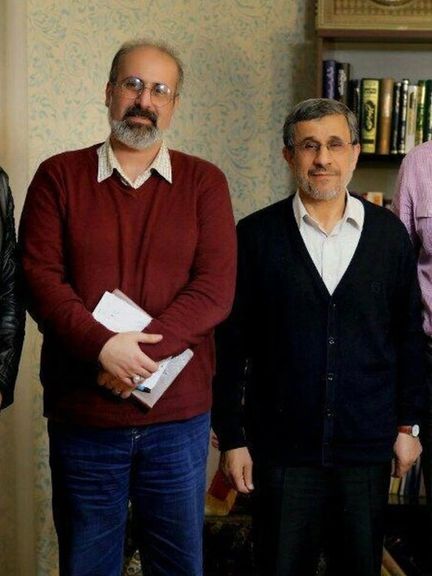
He pointed out that except Ahmadinejad all political factions and politicians including former reformist President Mohammad Khatami have voiced support for Hamas and condemned Israel. They all echoed Khamenei’s position while perhaps Ahmadinejad had a different opinion.
He further accused Ahmadinejad of believing that "the Islamic Republic cannot survive, and he can be the regime's alternative when it collapses."
Meanwhile, In a video that surfaced on social media, vigilante leader Hossein Allahkaram said that because of Ahmadinejad's poor performance during his presidency Iran nearly lost Syria as the "Resistance's most important base” in the region. Resistance is the Islamic Republic's jargon for anti-US forces in Iran, Syria, Iraq, Lebanon and Yemen.
Another close aide of Ahmadinejad, Mehdi Kalhor, also made negative comments to Asr Iran news website about Ahmadinejad’s populism and how his aides fanned his ambitions.
Kalhor accused Ahmadinejad of disclosing family information about his opponent, Mir Hossein Mousavi in the 2009 presidential campaign. Kolhar alleged that Ahmadinejad was privy to Mousavi’s family life because of his close ties with him and his family. Mousavi was one of Ahmadinejad's teachers when he was a student. Later they became family friends. He even admitted during the televised debate that he was one of Mousavi's students.
Kolhar admitted, however, that what Ahmadinejad disclosed about Mousavi and his wife was insignificant and only showed that Ahmadinejad was an opportunist who would use information about a friend for political gain.
Other politicians and media, noted that some of Ahmadinejad's former allies are now working with hardliner Paydari Party Leader Sadeq Mahsouli and Parviz Fattah, another powerful politician close to Khamenei’s office. Mahsouli and Fattah were Ahmadinejad's aids and cabinet ministers during his presidency.
Recently, conservative heavyweight Mohammad Reza Bahonar who is a candidate for the March parliamentary elections had said that Ahmadinejad is planning to present a list of candidates. The mudslinging against Ahmadinejad by conservatives, who are likely to be the only players in the election, could be an attempt to tarnish his image among those who are likely to vote for the candidates he nominates.

The US Navy in the Persian Gulf “intercepted” an Iranian drone “operating in an unsafe and unprofessional” manner, CENTCOM reported on Saturday.
Announcing the incident on X, the US military did not provide more detail except a photo taken from a US aircraft showing an unmanned aerial aircraft flying above what appeared to be an aircraft carrier. It did not say if the drone had left after it was intercepted, or what that term exactly meant.
Iranian military officials boasted earlier that their drones were closely following the US naval strike group led by the aircraft carrier Dwight D Eisenhower that entered the Persian Gulf earlier in the week. The naval group was first sent to the eastern Mediterranean after war broke out between Israel and Hamas following the October 7 attack on Israel that killed more than 1,000 civilians and the taking of more than 200 hostages by Hamas.
Despite daily statements in support of Hamas, Iran has avoided direct involvement in the war, but its proxy forces in the region have attacked US forces dozens of times since mid-October.
Alireza Tangsiri, commander of the IRGC navy said on Friday that warships belonging to foreign countries were in the Persian Gulf region only to “foment tensions”.
Tangsiri claimed earlier in the week that his forces had sent drones to harass the operations of the USS Dwight D. Eisenhower aircraft carrier and its strike group. The incident was confirmed and described as "unsafe, unprofessional and irresponsible" in a statement issued Wednesday by US Naval Forces Central Command chief Vice Admiral Brad Cooper.
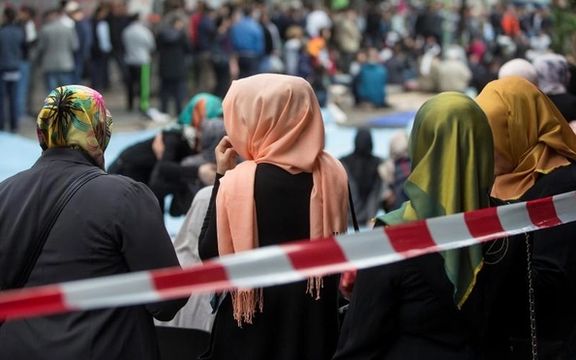
The German human rights commissioner who rebuffed Iranian female dissidents on Thursday, reportedly views the hijab as a form of emancipation for women.
The Iranian dissident, Masih Alinejad, pulled the plug on a meeting with the federal human rights commissioner, Luise Amtsberg, because Amtsberg did not wish to publicize the substance of the discussion.
The German magazine Stern reported in 2017 that the Green party politician had said she learned the head scarf can be a sign of emancipation, adding “We forget that sometimes.”
Amtsberg wrote her master’s thesis on “Feminism in Islam: Using the example of the Palestinian women’s movement.”
Lawdan Bazargan, a California-based Iranian-American political and human rights activist, told Iran International, “The hijab is an ideology, and like any ideological belief, it is linked to 'interests' and 'power.’ The hijab serves a dual function; it privileges veiled women in Islamic societies while also helping to reproduce the system's inherent patriarchy."
Bazargan, who is currently campaigning to secure the dismissal of Oberlin College’s Mohammad Jafar Mahallati, Iran’s former ambassador to the UN, added, “Ultimately, the hijab humiliates and disempowers women in society. It is shameful for a European woman, born and raised in a democratic country with liberal values, to idolize a symbol that oppresses millions of women, acting like a chain around their necks, suffocating them.”
Alinejad has long campaigned against the hijab. The Islamic Republic of Iran imposed the mandatory hijab on women after the 1979 revolution in 1981.
Iran International reported last week that the clerical regime has impounded the cars of people who violate the rules of the mandatory Hijab. In 2022, after dozens of Iranian women unveiled in public and sent their videos to Alinejad in New York, the clerical regime said women can be sentenced up to 10 years in jail for sending Alinjead the footage.
The outrage over Amtsberg’s attempt to silence the Iranian dissidents in Berlin has shined a new spotlight on the Green party’s overly cordial relationship with the Islamic Republic.
Amtsberg’s Green party has a long tradition of holding public meetings with Iranian regime officials and politicians who have denied the Holocaust, defended the use of stoning for adultery, and engaged in killing Iranians.
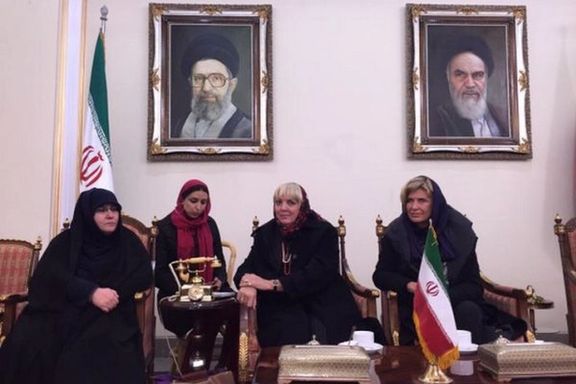
In 2019, Germany’s best-selling newspaper, Bild, published a series of news articles and an editorial titled “Shame on the Bundestag” that exposed the then-Green party Bundestag vice president Claudia Roth’s enthusiastic greeting of the former speaker of the Iran’s ersatz parliament, Ali Larijani.
Larijani defended former Iranian president Mahmoud Ahmadinejad’s denial of the Holocaust at the 2009 Munich Security Conference.
Roth is currently Germany’s cultural minister and, in 2010, met in Tehran with the former speaker's brother, Mohammad-Javad Larijani, who defended the stoning of people who committed adultery. Mohammad-Javad Larijani served as the head of the Iranian Human Rights Council. A year before Roth’s meeting, he denied the Holocaust at a German foreign ministry-sponsored event in Berlin held close to the Holocaust memorial.
Roth courted Manouchehr Mottaki who, while foreign minister, delivered a key speech at Tehran’s 2006 Holocaust denial conference.
The largely pro-Iran politician, Roth, also high-fived then-Iran ambassador to Germany, Reza Sheikh Attar, at the 2013 Munich Security Conference. Iranian Kurdish dissidents accused Attar of carrying out a massacre of Kurds during his tenure as governor of Kurdistan and West Azerbaijan provinces between 1980-1985.
The German foreign minister, Annalena Baerbock, has also faced intense criticism from German opposition politicians and Iranian dissidents for her dovish posture toward Tehran. Baerbock refuses to sanction the IRGC as a terrorist organization. She claims to practice a “feminist foreign policy” but her inaction toward the IRGC—a US-designated terrorist organization dedicated to enforcing the mandatory hijab—has sparked criticism from Alinejad and other Iranian dissidents.
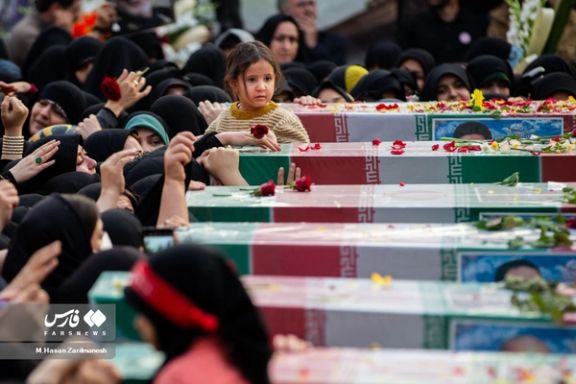
In the latest Israeli airstrike targeting Syria, Brigadier Generals Panah Taghizadeh and Mohammad-Ali Ataei (Shoorcheh) of the Islamic Revolutionary Guard Corps (IRGC) were killed.
The IRGC confirmed their deaths, stating that the generals were on an "advisory" mission in Syria. The Guards' Sepah News website reported, "Mohammed Ali Ataei Shoorcheh and Panah Taghizadeh... were martyred by the Zionist usurper enemy while conducting an advisory mission in the Syrian Islamic resistance front," without providing further details.
Israeli airstrikes hit several areas on the outskirts of Damascus early Saturday, causing "material losses," according to Syrian state media. The strikes targeted the southern Damascus suburb of Sayyida Zeinab, where Hezbollah-affiliated forces operate. The Syrian Observatory for Human Rights reported two Syrian citizens and two foreigners killed, with five others wounded.
Israel has frequently conducted airstrikes in Syria since the civil war began in 2011, focusing on Iran-backed forces, Hezbollah fighters, and Syrian army positions. The recent surge in attacks aligns with the Israel-Hamas conflict that started in October.
The incident is expected to heighten tensions between Israel and Iran, a key supporter of the Palestinian group Hamas. Iran has warned of the conflict's potential spread to other regional areas. Israel remains concerned about Iran's military presence in Syria and is committed to preventing Iranian entrenchment along its northern border.
During the ongoing Israel-Hamas conflict, Israel has targeted Syria, impacting international airports in Damascus and Aleppo for over a month. Iran has played a significant role in supporting Syrian President Bashar al-Assad throughout the 12-year civil war, deploying fighters to tip the balance in Assad's favor. Despite Tehran maintaining a military advisory role, numerous Iranian Revolutionary Guard members have lost their lives in the Syrian conflict.
Tweet unavailable
Tweet unavailable